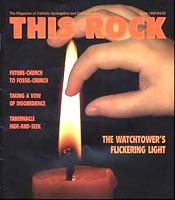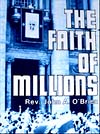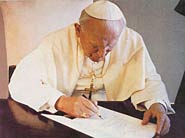
Catholic
 “It is well to remind the Presbyterians, Baptists, Methodists, and all other Christians, that the Bible does not support them anywhere in their observance of Sunday.
“It is well to remind the Presbyterians, Baptists, Methodists, and all other Christians, that the Bible does not support them anywhere in their observance of Sunday. Sunday
is an institution of theRoman Catholic Church
, and those who observe the day observe a commandment of theCatholic Church
.” Priest Brady, in an address, reported in the Elizabeth, NJ ‘News’ on March 18, 1903."Protestants ... accept Sunday rather than Saturday as the day for public worship after the Catholic Church made the change... But the Protestant mind does not seem to realize that ... in observing Sunday, they are accepting the authority of the spokesman for the Church,
the pope
."Our Sunday Visitor
, February 5th, 1950.“Of course these two old quotations are exactly correct. The Catholic Church designated Sunday as the day for corporate worship and gets full credit – or blame – for the change.” This Rock, The Magazine of Catholic Apologetics and Evangelization, p.8, June 1997
 Q. Have you any other proofs that they(Protestants) are not guided by the Scripture?
Q. Have you any other proofs that they(Protestants) are not guided by the Scripture?A. Yes; so many, that we cannot admit more than a mere specimen into this small work. They reject much that is clearly contained in Scripture, and profess more that is nowhere discoverable in that Divine Book.
Q. Give some examples of both?
A. They should, if the Scripture were their only rule, wash the feet of one another, according to the command of Christ, in the 13th chap. of St. John; —they should keep, not the Sunday, but the Saturday, according to the commandment, "Remember thou keep holy the SABBATH-day;" for this commandment has not, in Scripture, been changed or abrogated;... Rev. Stephen Keenan, A Doctrinal Catechism; New York in 1857, page 101 Imprimatuer
Q. Have you any other way of proving that the Church has power to institute festivals of precept?
A. Had she not such power, she could not have done that in which all modern religionists agree with her; —she could not have substituted the observance of Sunday the first day of the week, for the observance of Saturday the seventh day, a change for which there is no Scriptural authority. Rev. Stephen Keenan, A Doctrinal Catechism; New York in 1857, page 174
Q. In what manner can we show a Protestant, that he speaks unreasonably against fasts and abstinences?
A. Ask him why he keeps Sunday, and not Saturday, as his day of rest, since he is unwilling either to fast or to abstain. If he reply, that the Scripture orders him to keep the Sunday, but says nothing as to fasting and abstinence, tell him the Scripture speaks of Saturday or the Sabbath, but gives no command anywhere regarding Sunday or the first day of the week. If, then he neglects Saturday as a day of rest and holiness, and substitutes Sunday in its place, and this merely because such was the usage of the ancient Church, should he not, if he wishes to act consistently, observe fasting and abstinence, because the ancient Church so ordained? Rev. Stephen Keenan, A Doctrinal Catechism; New York in 1857, page 181

Question: Which is the Sabbath day?
Answer: Saturday is the Sabbath day.
Question: Why do we observe Sunday instead of Saturday?
Answer: We observe Sunday instead of Saturday because the Catholic Church transferred the solemnity from Saturday to Sunday.” -Rev. Peter Geiermann C.SS.R., The Convert’s Catechism of Catholic Doctrine, p. 50
Q. Must not a sensible Protestant doubt seriously, when he finds that even the Bible is not followed as a rule by his co-religionists?
A. Surely, when he sees them baptize infants, abrogate the Jewish Sabbath, and observe Sunday for which [pg. 7] there is no Scriptural authority; when he finds them neglect to wash one another's feet, which is expressly commanded, and eat blood and things strangled, which are expressly prohibited in Scripture. He must doubt, if he think at all. ...
Q. Should not the Protestant doubt when he finds that he himself holds tradition as a guide?
A. Yes, if he would but reflect that he has nothing but Catholic Tradition for keeping the Sunday holy; ... Controversial Catechism by Stephen Keenan, New Edition, revised by Rev. George Cormack, published in London by Burns & Oates, Limited - New York, Cincinnati, Chicago: Benzinger Brothers, 1896, pages 6, 7.
"The Church, on the other hand, after changing the day of rest from the Jewish Sabbath, or seventh day of the week, to the first, made the Third Commandment refer to Sunday as the day to be kept holy as the Lord's Day. The Council of Trent (Sess. VI, can. xix) condemns those who deny that the Ten Commandments are binding on Christians." The Catholic Encyclopedia, Commandments of God, Volume IV, © 1908 by Robert Appleton Company, Online Edition © 1999 by Kevin Knight, Nihil Obstat - Remy Lafort, Censor Imprimatur - +John M. Farley, Archbishop of New York, page 153.
''The [Roman Catholic] Church changed the observance of the Sabbath to Sunday by right of the divine, infallible authority given to her by her founder, Jesus Christ. The Protestant claiming the Bible to be the only guide of faith, has no warrant for observing Sunday. In this matter the Seventh-day Adventist is the only consistent Protestant.'' The Catholic Universe Bulletin, August 14, 1942, p. 4.
"All of us believe many things in regard to religion that we do not find in the Bible. For example, nowhere in the Bible do we find that Christ or the Apostles ordered that the Sabbath be changed from Saturday to Sunday. We have the commandment of God given to Moses to keep holy the Sabbath Day, that is the 7th day of the week, Saturday. Today most Christians keep Sunday because it has been revealed to us by the Church outside the Bible." The Catholic Virginian, "To Tell You The Truth,” Vol. 22, No. 49 (Oct. 3, 1947).
"... you may read the Bible from Genesis to Revelation, and you will not find a single line authorizing the sanctification of Sunday. The Scriptures enforce the religious observance of Saturday, a day which we never sanctify." The Faith of Our Fathers, by James Cardinal Gibbons, Archbishop of Baltimore, 88th edition, page 89. Originally published in 1876, republished and Copyright 1980 by TAN Books and Publishers, Inc., pages 72-73.
'Deny the authority of the Church and you have no adequate or reasonable explanation or justification for the substitution of Sunday for Saturday in the Third - Protestant Fourth - Commandment of God... The Church is above the Bible, and this transference of Sabbath observance is proof of that fact.'' Catholic Record, September 1, 1923.
 "But since Saturday, not Sunday, is specified in the Bible, isn't it curious that non-Catholics who profess to take their religion directly from the Bible and not the Church, observe Sunday instead of Saturday? Yes, of course, it is inconsistent; but this change was made about fifteen centuries before Protestantism was born, and by that time the custom was universally observed. They have continued the custom, even though it rests upon the authority of the Catholic Church and not upon an explicit text in the Bible. That observance remains as a reminder of the Mother Church from which the non-Catholic sects broke away - like a boy running away from home but still carrying in his pocket a picture of his mother or a lock of her hair."The Faith of Millions
"But since Saturday, not Sunday, is specified in the Bible, isn't it curious that non-Catholics who profess to take their religion directly from the Bible and not the Church, observe Sunday instead of Saturday? Yes, of course, it is inconsistent; but this change was made about fifteen centuries before Protestantism was born, and by that time the custom was universally observed. They have continued the custom, even though it rests upon the authority of the Catholic Church and not upon an explicit text in the Bible. That observance remains as a reminder of the Mother Church from which the non-Catholic sects broke away - like a boy running away from home but still carrying in his pocket a picture of his mother or a lock of her hair."The Faith of Millions"Perhaps the boldest thing, the most revolutionary change the Church ever did, happened in the first century. The holy day, the Sabbath, was changed from Saturday to Sunday. "The Day of the Lord" (dies Dominica) was chosen, not from any directions noted in the Scriptures, but from the Church's sense of its own power. The day of resurrection, the day of Pentecost, fifty days later, came on the first day of the week. So this would be the new Sabbath. People who think that the Scriptures should be the sole authority, should logically become 7th Day Adventists, and keep Saturday holy." Sentinel, Pastor's page, Saint Catherine Catholic Church, Algonac, Michigan, May 21, 1995
“If Protestants would follow the Bible, they would worship God on the Sabbath Day. In keeping the Sunday they are following a law of the Catholic Church.” Albert Smith, Chancellor of the Archdiocese of Baltimore, replying for the Cardinal, in a letter dated February 10, 1920.
“The observance of Sunday by the Protestants is homage they pay, in spite of themselves, to the authority of the [Catholic] Church.” Monsignor Louis Segur, ‘Plain Talk about the Protestantism of Today’, p. 213.
What Important Question Does the Papacy Ask Protestants?
Protestants have repeatedly asked the papacy, "How could you dare to change God's law?" But the question posed to Protestants by the Catholic church is even more penetrating.
Here it is officially: ""You will tell me that Saturday was the Jewish Sabbath, but that the Christian Sabbath has been changed to Sunday. Changed! but by whom? Who has authority to change an express commandment of Almighty God? When God has spoken and said, Thou shalt keep holy the seventh day, who shall dare to say, Nay, thou mayest work and do all manner of worldly business on the seventh day; but thou shalt keep holy the first day in its stead?
This is a most important question, which I know not how you can answer. You are a Protestant, and you profess to go by the Bible and the Bible only; and yet in so important a matter as the observance of one day in seven as a holy day, you go against the plain letter of the Bible, and put another day in the place of that day which the Bible has commanded.
What Important Question Does the Papacy Ask Protestants?
Protestants have repeatedly asked the papacy, "How could you dare to change God's law?" But the question posed to Protestants by the Catholic church is even more penetrating.
Here it is officially: ""You will tell me that Saturday was the Jewish Sabbath, but that the Christian Sabbath has been changed to Sunday. Changed! but by whom? Who has authority to change an express commandment of Almighty God? When God has spoken and said, Thou shalt keep holy the seventh day, who shall dare to say, Nay, thou mayest work and do all manner of worldly business on the seventh day; but thou shalt keep holy the first day in its stead?
This is a most important question, which I know not how you can answer. You are a Protestant, and you profess to go by the Bible and the Bible only; and yet in so important a matter as the observance of one day in seven as a holy day, you go against the plain letter of the Bible, and put another day in the place of that day which the Bible has commanded.
The command to keep holy the seventh day is one of the ten commandments; you believe that the other nine are still binding; who gave you authority to tamper with the fourth? If you are consistent with your own principles, if you really follow the Bible and the Bible only, you ought to be able to produce some portion of the New Testament in which this fourth commandment is expressly altered."" *Library of Christian Doctrine: Why Don't You Keep Holy the Sabbath-Day? (London: Burns and Oates, Ltd.), pp. 3, 4.
"There is but one church on the face of the earth which has the power, or claims power, to make laws binding on the conscience, binding before God, binding under penalty of hell-fire. For instance, the institution of Sunday. What right has any other church to keep this day? You answer by virtue of the third commandment (the papacy did away with the 2nd regarding the worship of graven images, and called the 4th the 3rd), which says 'Remember that thou keep holy the Sabbath day.' But Sunday is not the Sabbath. Any schoolboy knows that Sunday is the first day of the week. I have repeatedly offered one thousand dollars to anyone who will prove by the Bible alone that Sunday is the day we are bound to keep, and no one has called for the money. It was the holy Catholic Church that changed the day of rest from Saturday, the seventh day, to Sunday, the first day of the week." - T. Enright, C.S.S.R., in a lecture delivered in 1893. ''Of course the Catholic Church claims that the change was her act. And the act is a mark of her ecclesiastical power and authority in religious matters.'' C. F. Thomas, Chancellor of Cardinal Gibbons, in answer to a letter regarding the change of the Sabbath, November 11, 1895.
“Tradition, not Scripture, is the rock on which the church of Jesus Christ is built.” Adrien Nampon, Catholic Doctrine as Defined by the Council of Trent, p. 157
"The Pope is of so great authority and power that he can modify, explain, or interpret even divine law". The pope can modify divine law, since his power is not of man, but of God, and he acts a vicegerent of God upon earth" Lucius Ferraris, Prompta Bibliotheca, art. Papa, II, Vol. VI, p. 29.
 "The leader of the Catholic church is defined by the faith as the Vicar of Jesus Christ (and is accepted as such by believers). The Pope is considered the man on earth who "takes the place" of the Second Person of the omnipotent God of the Trinity." John Paul II, Crossing the Threshold of Hope, p. 3, 1994
"The leader of the Catholic church is defined by the faith as the Vicar of Jesus Christ (and is accepted as such by believers). The Pope is considered the man on earth who "takes the place" of the Second Person of the omnipotent God of the Trinity." John Paul II, Crossing the Threshold of Hope, p. 3, 1994 "...pastoral intuition suggested to the Church the christianization of the notion of Sunday as "the day of the sun", which was the Roman name for the day and which is retained in some modern languages.(29) This was in order to draw the faithful away from the seduction of cults which worshipped the sun, and to direct the celebration of the day to Christ, humanity's true "sun"." John Paul II, Dies Domini, 27. The day of Christ-Light, 1998 (Prominent protestant leaders agree with this statement - See here for a statement by Dr. E. T. Hiscox, author of the ‘Baptist Manual’)


